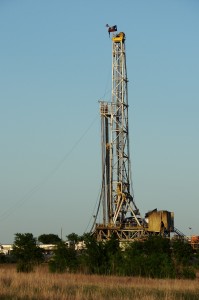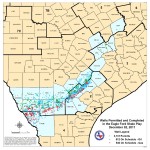Hungry for Electricity, Mexico Considers Border Fracking
The Eagle Ford Shale formation in South Texas has made headlines for its abundance of natural gas, but the formation doesn’t end at the Rio Grande. That fact is not lost on the Mexican government.

This rig uses hydraulic fracturing to obtain gas from Texas' Barnett Shale formation. Photo courtesy of KUT News.
Last week, the Mexican Minister of Energy proposed ramping up hydraulic fracturing operations in Northern Mexico. The announcement wasn’t especially newsworthy for many this side of the border, but down South?
“It’s huge! It’s huge!” said Jaime Williams, president of the energy and climate change commission of CONCAMIN in Monterrey, which is akin to Mexico’s industrial chamber of commerce.
“We are the interested party! The industrial sector, the private sector is the interested party in it,” Williams told KUT News.
Williams said the maquilas (factories) in Mexican border states use a lot of electricity. They’ve been importing more and more natural gas from Texas just to keep the lights on in recent years.
“And they’re looking – just like we are – to become more energy independent,” said Bob Gibb, who specializes in the energy industry for Navigant Consulting.
Gibb said the U.S. exports around four billion cubic feet of gas to Mexico every day, up from three billion just a year ago. Mexico’s governmental structure could enable the ramping up of its own production, he said.
“I would suspect that it’s going to be something that they will be able to accelerate, if you will, at a greater rate of development than we can in the United States. They’re not as likely to have the political discussion that we have here,” Gibb told KUT News. “That’s not to say they’re going to ignore it. They’re just going to be able to address it a little more quickly.”
Pemex is the state-run company that owns Mexico’s oil and gas resources. Under Mexican law, the country owns those resources, even if they’re discovered under private property. That speeds up the process, but a lack of technical expertise could hinder drilling. Gibb said Pemex’s previous efforts to partner with foreign companies have not been very successful.
“They may have to look at that again, if they want to develop this huge resource, that Pemex itself today doesn’t have the capability to do it,” he said.
Gibb doesn’t think Mexico getting into the gas business will have negative financial effects on the U.S. industry. Expanded drilling in the border region is troubling for environmentalists in Texas, however. They continue to raise concerns over the fracking techniques that let companies extract gas from shale formations that were previously unreachable.
“Absolutely, Mexico has a pretty bad track record on environmental enforcement. They put far less money into it,” said Luke Metzger, the director of Environment Texas. “And so certainly we’ve seen, for any number of industries, that officials have looked the other way when there are violations of the law.”
Environmentalists are worried about the risks of methane gas pollution associated with drilling and the large quantities of water used to extract gas. Metzger said, if Mexico does ramp up its fracking, it would be well-served to look to best practices in the U.S.
“Hopefully they will adopt strong environmental standards, if they go down this path,” Metzger said.
Back in Mexico, Jaime Williams says his country is well-equipped to handle environmental dangers. The real roadblock standing between Mexico and a booming natural gas industry, he said, might be financial. Pemex, like much of the energy sector, is investing most of its money in oil drilling, which has a bigger return on investment. Williams is left hoping that the Mexican government will allow private investors to partner with foreign firms–the same talked about by Bob Gibb–to kick start Mexico’s natural gas economy.
“We say in Spanish: ‘No picha, no catcha and no deja batear?’” said Williams, laughing. “They’re not pitching, they’re not catching and they don’t allow us to bat! So what can we do? If they’re not going to play, well move aside and let us play!”
If they do make a play, said Williams, it would encourage even more industry in Mexico; growth that would also affect both sides of the border.
